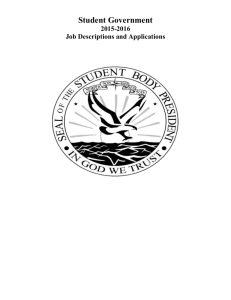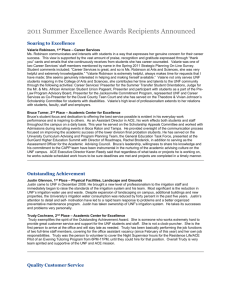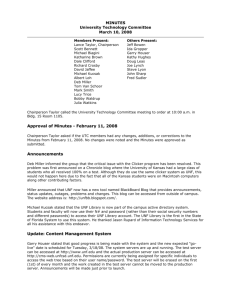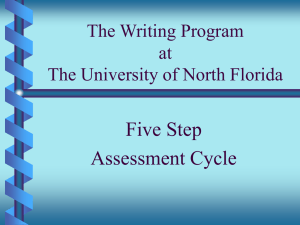Graduate School Checklist - University of North Florida
advertisement
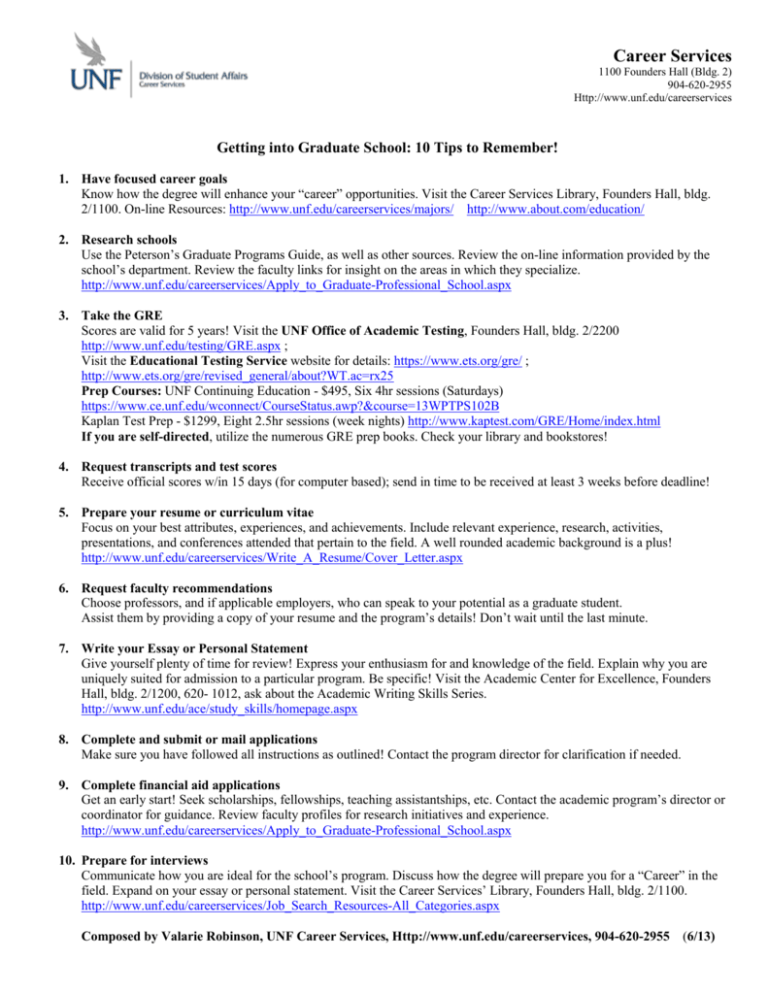
Career Services 1100 Founders Hall (Bldg. 2) 904-620-2955 Http://www.unf.edu/careerservices Getting into Graduate School: 10 Tips to Remember! 1. Have focused career goals Know how the degree will enhance your “career” opportunities. Visit the Career Services Library, Founders Hall, bldg. 2/1100. On-line Resources: http://www.unf.edu/careerservices/majors/ http://www.about.com/education/ 2. Research schools Use the Peterson’s Graduate Programs Guide, as well as other sources. Review the on-line information provided by the school’s department. Review the faculty links for insight on the areas in which they specialize. http://www.unf.edu/careerservices/Apply_to_Graduate-Professional_School.aspx 3. Take the GRE Scores are valid for 5 years! Visit the UNF Office of Academic Testing, Founders Hall, bldg. 2/2200 http://www.unf.edu/testing/GRE.aspx ; Visit the Educational Testing Service website for details: https://www.ets.org/gre/ ; http://www.ets.org/gre/revised_general/about?WT.ac=rx25 Prep Courses: UNF Continuing Education - $495, Six 4hr sessions (Saturdays) https://www.ce.unf.edu/wconnect/CourseStatus.awp?&course=13WPTPS102B Kaplan Test Prep - $1299, Eight 2.5hr sessions (week nights) http://www.kaptest.com/GRE/Home/index.html If you are self-directed, utilize the numerous GRE prep books. Check your library and bookstores! 4. Request transcripts and test scores Receive official scores w/in 15 days (for computer based); send in time to be received at least 3 weeks before deadline! 5. Prepare your resume or curriculum vitae Focus on your best attributes, experiences, and achievements. Include relevant experience, research, activities, presentations, and conferences attended that pertain to the field. A well rounded academic background is a plus! http://www.unf.edu/careerservices/Write_A_Resume/Cover_Letter.aspx 6. Request faculty recommendations Choose professors, and if applicable employers, who can speak to your potential as a graduate student. Assist them by providing a copy of your resume and the program’s details! Don’t wait until the last minute. 7. Write your Essay or Personal Statement Give yourself plenty of time for review! Express your enthusiasm for and knowledge of the field. Explain why you are uniquely suited for admission to a particular program. Be specific! Visit the Academic Center for Excellence, Founders Hall, bldg. 2/1200, 620- 1012, ask about the Academic Writing Skills Series. http://www.unf.edu/ace/study_skills/homepage.aspx 8. Complete and submit or mail applications Make sure you have followed all instructions as outlined! Contact the program director for clarification if needed. 9. Complete financial aid applications Get an early start! Seek scholarships, fellowships, teaching assistantships, etc. Contact the academic program’s director or coordinator for guidance. Review faculty profiles for research initiatives and experience. http://www.unf.edu/careerservices/Apply_to_Graduate-Professional_School.aspx 10. Prepare for interviews Communicate how you are ideal for the school’s program. Discuss how the degree will prepare you for a “Career” in the field. Expand on your essay or personal statement. Visit the Career Services’ Library, Founders Hall, bldg. 2/1100. http://www.unf.edu/careerservices/Job_Search_Resources-All_Categories.aspx Composed by Valarie Robinson, UNF Career Services, Http://www.unf.edu/careerservices, 904-620-2955 (6/13) Graduate School Checklist The timeline below represents a common checklist that most students should follow. However, always check with the institution and program you are interested in for specific deadlines. Junior Year, Fall & Spring ____ Research areas of interest, institutions, and programs. ____ Talk to people (advisors, faculty, professionals) about your area(s) of interest. ____ Plan to take relevant courses no later than fall of senior year (since transcripts will be sent then). ____ Register and prepare for the appropriate graduate admissions test: GRE (graduate school), GMAT (business), LSAT (law), and MCAT (medical). ____ Consider taking a practice graduate/professional school test. Kaplan offers free prep tests several times a year which can help predict how you will score on the actual test. ____ Begin researching scholarships, grants, assistantships and fellowships and make note of deadlines. ____ Attend graduate and professional school fairs, if available. Junior Year, Summer ____ Take graduate admissions tests. Learn whether schools accept your highest score or an average of all tests taken. ____ Contact schools for application materials and make note of deadlines. ____ If possible, visit schools of interest. ____ Begin working on your application essay. ____ Note application deadlines and policies. ____ Law school applicants should register for the data assembly service most programs use (www.lsac.org). Senior Year, Fall: September/October ____ Explore the Career Services library (2/1100) which features graduate and professional school catalogs. ____ Attend graduate and professional school fairs. ____ Register with the Testing Center to take graduate/professional school tests, if not yet completed: GRE (graduate school), GMAT (business), LSAT (law), and MCAT (medical). ____ Ask faculty members to write letters of recommendation. Senior Year, Fall: November ____ Continue researching graduate/professional school options and fellowships. ____ Write your application essays and have them reviewed by your career counselor and/or a faculty member. ____ Speak with advisors and alumni regarding program strengths and reputation. ____ List tentative decisions about your future and develop several realistic scenarios (whether or not to apply to graduate schools, what to do if the schools you are interested in wait list you, etc.). Senior Year, Fall: December ____ Talk with alumni, networking contacts, or faculty who may have attended graduate programs you are interested in attending. ____ Complete and mail applications. Senior Year, Spring ____ Send in completed applications, if not yet done. ____ Apply for financial aid. (Contact the schools to which you have applied.) ____ Check with all institutions before the deadline to make sure your file is complete. (Some schools may require you to send in all materials at one time.) ____ Visit institutions that accept you. ____ Send appropriate information to the school you have selected. ____ Send a deposit to your institution of choice. ____ Notify other colleges and universities that accepted you of your decision, so they can admit students on their waiting list. ____ Send thank you letters to people who wrote you recommendation letters or helped you in the application process. Composed by Paula Michael-Dass, revised by Valarie Robinson, University of North Florida Career Services Office Http://www.unf.edu/careerservices, Founders Hall, Room 1100, 904-620-2955 (2/13) Founders Hall, Building 2, Suite 1100 904-620-2955 www.unf.edu/careerservices Career Services Overview I. Engage in the career planning process Self-Assessment: Know your Values, Interests, Personality strengths, and Skills Exploration: Research career options and network with people in your field of study Decision-making: Identify your “ideal” employers or graduate school; learn what they expect of you Implementation: Secure multiple practical hands-on experiences in your field of interest II. You’ve decided on a major…now what?? a. Become an “expert” concerning your career goal; Be proactive, take ownership, it’s “your future” b. Review your academic department’s webpage c. Attend events offered by your Academic Department, Career Services and the University d. Meet with your Career Services’ COAS Liaisons: Valarie Robinson and Dee Dee Wyckoff III. Career Services resources A. Career Wings UNF’s on-line career portal. Sign up today for this free service a. Can be accessed via My Wings, under Quick Links B. Career Services website: www.unf.edu/careerservices. Click the “Students” link (left menu bar) Career and major exploration: Resources to help you research information about academic majors and careers What can I do with a major in…?: Sample job titles, professional associations and job links for UNF majors Cover letters: Tips and examples Resumes and curriculum vitae: Tips and examples Career resources: Information to help find, prepare, network, and interview for an internship or job search Career Services calendar: Attend monthly workshops, panels, and career events Career Spot Career Videos: Review video clips about various career and job search topics C. Career Commons Career computer lab, books, and publications about various career fields (Founders Hall, Building 2, Suite 1100) D. Career Services Events Osprey Career Fair (September and March) Volunteer Fair (October and March) Internship Fair (February) Various career related workshops and employer panels each semester E. Employability Skills Program Attend two ESP Workshops or ESP Career Panels. R.S.V.P. via Career Wings’ Career Events tab. Topics include job search skills, resume/cover letter development, interview skills, employer informational panels and more Have your resume critiqued: upload in Career Wings or call Career Services for an appointment Complete a practice interview: contact Career Services for an appointment IV. Career Class: Employability Skills and Career Success, SLS 3408 Teaches a variety of job search strategies that will give you the competitive edge to make a successful transition from academics to the world of work Designed for upper level students M/W, 1:30 -2:45 p.m. or T/R 1:40-2:55 p.m. V. What are some of the job titles and starting salaries of College of Arts and Sciences alumni? COAS alumni work in many fields: business, health, education, government and non-profit; job titles vary Review salary information for specific career titles on the Florida Agency for Workforce Innovation website Visit www.floridajobs.org. Click on “About Us” and then “Labor Market Information” (top menu bar), Occupational Employment Statistics and Wages (OES), and select your desired option
